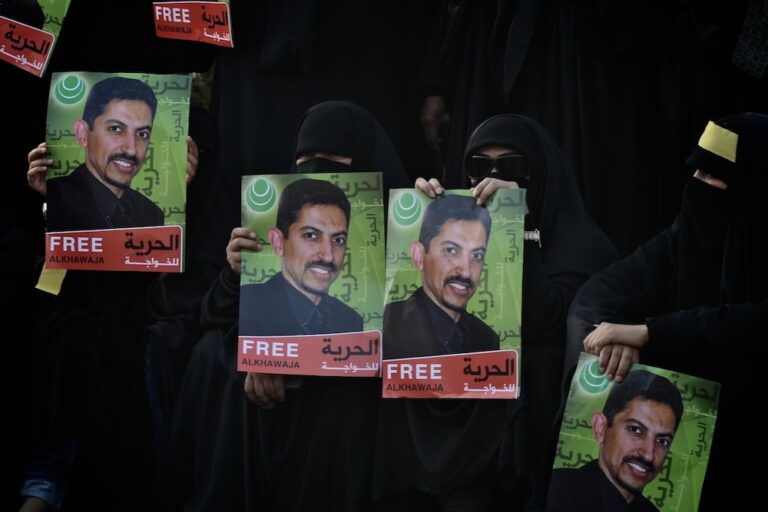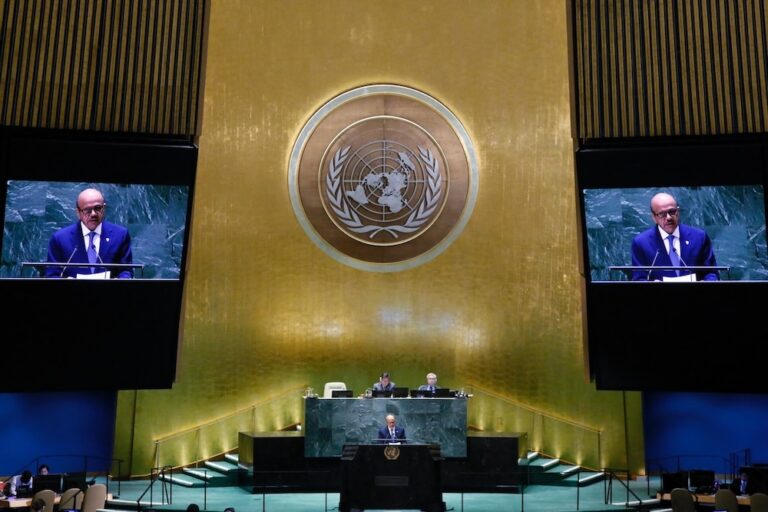(CPJ/IFEX) – The following is an abridged version of a 7 April 2009 CPJ letter: CPJ concerned about Bahrain Web crackdown April 7, 2009 His Majesty Sheikh Hamad bin Isa Al Khalifa King of Bahrain C/O The Embassy of the Kingdom of Bahrain 3502 International Drive, NW Washington, D.C. 2008 Via facsimile: 202-362-2192 Your Majesty, […]
(CPJ/IFEX) – The following is an abridged version of a 7 April 2009 CPJ letter:
CPJ concerned about Bahrain Web crackdown
April 7, 2009
His Majesty Sheikh Hamad bin Isa Al Khalifa
King of Bahrain
C/O The Embassy of the Kingdom of Bahrain
3502 International Drive, NW
Washington, D.C. 2008
Via facsimile: 202-362-2192
Your Majesty,
The Committee to Protect Journalists is writing to protest the recent deterioration of press freedom in Bahrain and your government’s ongoing campaign against critical or opposition Web sites and blogs. The crackdown against those sites has resulted in dozens of them being blocked inside the kingdom, according to local and international human rights and press freedom watchdogs.
CPJ is concerned about a campaign targeting independent or critical Web sites that discuss social, political, and human rights issues, especially with the backdrop of an escalating crackdown on Shi’a activists, opposition figures, and human rights defenders. In January, local media outlets published ministerial order 1/2009, issued by Culture and Information Minister Sheikha Mai bint Muhammad Al Khalifa, ordering telecommunications companies to block specific Web sites without warning or providing specific reasons when ordered to by the ministry. Dozens of blogs, discussion forums, and sites of local and regional human rights groups have been blocked since.
Authorities have described their campaign as one against pornographic and socially inappropriate Web sites, but CPJ research reveals that the sites of dozens of human rights groups, opposition or independent bloggers, and political organizations have been blocked inside Bahrain. Article 2 of the order states that “all telecommunications companies and Internet service providers must block Web sites that are pornographic or violate public decency,” but Article 1 compels those companies to block Web sites on order from the minister, presumably even if they are not of a pornographic nature.
Freedom of expression advocates have argued that before this order was issued, Web sites and blogs that the government deemed troublesome were blocked anyway. But multiple sources told CPJ that the number of blocked sites has risen exponentially as of late. The Ministry of Culture and Information is using advanced technology that can filter keywords and block sites, multiple sources inside Bahrain told CPJ. Blocked sites feature a screen that reads: “This Web site has been blocked for violating regulations and laws of the Kingdom of Bahrain.”
On February 11, the Ministry of Culture and Information told Reuters that some Web sites had been blocked because of technical problems and that this would be resolved. But many sites blocked before February 11 are still inaccessible, local sources told CPJ.
For example, the Google Translation service has been blocked for the last three months, sources told CPJ. Abduljalil Alsingace, who blogs at http://www.alsingace.katib.org , told CPJ that his blog was blocked on February 10, after he posted a petition by an international group of intellectuals. Among the demands of the petition was the lifting of a travel ban on Alsingace. Alsingace migrated his entries to http://www.alsingace.blogspot.com . Both of his blogs remain inaccessible inside Bahrain, he told CPJ. Mahmood al-Yusef’s blog, Mahmood’s Den, which covers political and social issues among its topics, has been blocked for years within the country.
Most sources told CPJ that forums that discuss cultural, social, or political matters perceived as sensitive by the government are the most targeted Web sites. The political forum Multaqa al-Bahrain, the cultural forum Muntadayat al-Bahrain, and the cultural and political forum al-Sarh al-Watani have all been blocked. In addition, the Web sites of the Bahrain Center for Human Rights and the Arab Network for Human Rights Information have also been blocked for long periods of time and remain inaccessible inside the kingdom. Dozens of sites that provide proxy services are also inaccessible.
CPJ believes that Web sites and blogs must not be blocked arbitrarily. On the rare occasions when blocking a site is justified, it is incumbent on the authorities to make clear the reasons why. Without such a mechanism in place, as is currently the case in Bahrain, authorities have arbitrarily engaged in the censorship of critical voices by simply blocking access to them under the cover of protecting decency or national unity. CPJ research reveals that many sites blocked inside the kingdom have been guilty of nothing more than addressing social, political, or human rights concerns through a critical prism. That alone must not be grounds for censorship.
These acts of censorship contradict multiple provisions of the Bahraini Constitution, which guarantees the right of freedom of expression. They are also in violation of the International Covenant on Civil and Political Rights, which Bahrain ratified in 2006, which guarantees the freedom “to seek, receive, and impart information.”
(. . .)
Sincerely,
Joel Simon
Executive Director
For the full version of the letter, see: http://cpj.org/2009/04/cpj-concerned-about-bahrain-web-crackdown.php
For further information on the recent website bans, see: http://ifex.org/en/content/view/full/99882


